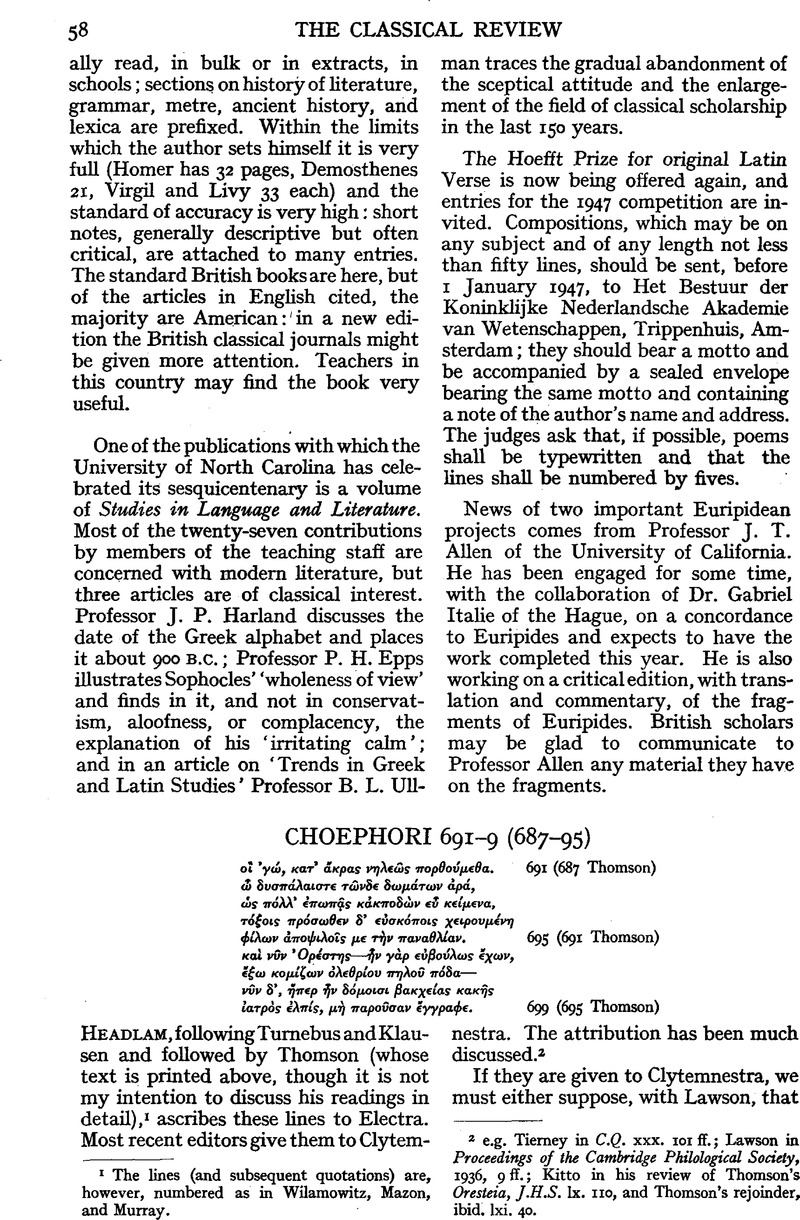No CrossRef data available.
Article contents
Choephori 691–9 (687–95)
Published online by Cambridge University Press: 27 October 2009
Abstract

- Type
- Review Article
- Information
- Copyright
- Copyright © The Classical Association 1946
References
page 58 note 1 The lines (and subsequent quotations) are, however, numbered as in Wilamowitz, Mazon, and Murray.
page 58 note 2 e.g. Tierney in C.Q. xxx. 101 ff.; Lawson, in Proceedings of the Cambridge Philological Society, 1936, 9ff.;Google Scholar Kitto in his review of Thomson's Oresteia, J.H.S. lx. 110, and Thomson's rejoinder, Ibid.. lxi. 40.
page 59 note 1 For Electra to pretend that Orestes had remained away from Argos out of caution is not (pace Tierney) inconsistent with Agam. 877 ff.: on reaching manhood he was a free agent to stay away or to return.
page 59 note 2 Accepting Headlam's explanation of παροῦσαν in relation to ὲλπίς.
page 59 note 3 Following 187 (πῶς γὰρ ἐλπίσω, κτλ.). For ἐλπίς in the Agam. cf. 101, 262, 266.
page 59 note 4 δακρνό ὲλπίς is itself an ambiguity with which we can compare Agam. 270 (tears of joy, and a joy that will ultimately evoke tears).
page 59 note 5 Or at least (if we follow Rossbach and Thomson in transposing 235–7 and attributing them to the Chorus) to the partisans of Agamemnon. The Nurse's 776 repeats the theme in all sincerity. On 539 see below.
page 59 note 6 Cf. Eum. 62 f.
page 59 note 7 On the role of Apollo in the trilogy I must refer to my article in C.R. xlvii. 97 ff. I strongly suspect that Eum. 24 f. has deliberate reference to Aeschylus' own treatment of the Pentheus story (lost to us, though it may have influenced the Bacchae of Euripides), and implies a comparison between Bacchanals, associated with Bromius, and the Furies, who prove to have a place in Apollo's sanctuary and in his, moral system. Other references to βακχεία in Aeschylus are Septem 498 and fr. 58, the former certainly, the latter probably in a context of violence, not of joy.
page 60 note 1 It is unnecessary to multiply references for the metaphor of disease and cure. But note 539, of the offering of Clytemnestra, where the themes of hope and cure are blended as here.
page 60 note 2 Eum. 417.
page 60 note 3 At 583 f. (τὰ δ' ἄλλα τούτῳ δεῦρ' ἐποπτεῦσαι λέγω, ξιφηφόρους ἀγῶνας ὀρθώσαντί μοι) it is uncertain to whom τούτῳ refers. To Agamemnon in the grave (Mazon)? To Apollo (Wilamowitz)? To Pylades (for which Thomson makes out a strong case in his edition)? If the second or third of these views is correct, it strengthens the argument which follows in the text above.
page 60 note 4 Cf. 985, 1063, and the preceding note.
page 60 note 5 The end of the story is of course in the Eumenides, with Athena, who ‘supervises’ the trial of Orestes (224), with the good Πειθώ, who guides her lips in the negotiation with the Furies (971), with Ζεὺς ὁ πανόπτας (1045).
page 60 note 6 Cf. Headlam ap. Thomson, , Oresteia, ii. 216.Google Scholar
page 60 note 7 If Thomson (following Schütz) is right at 145 f., we may say that the καλὴ ἀρά and the κακὴ ἀρά prove inextricable.
page 60 note 8 Cf. Thomson, C.Q. xxviii. 77; Aeschylus and Athens, 271.Google Scholar




